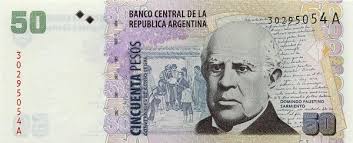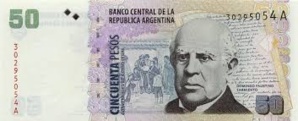In a surprising move, the urate of interest was raised by the central bank of Argentina thrice within a span of just eight days even as the currency of the country – peso, continued opt register a sharp downward journey.
About the week ago, the rate of interest in the country was 27.5 % which was first raised to 30.25% and then to 33.25% within a few days, and on Friday, the central bank again raised the rate to 40%.
The aim of the sharp rise in interest rates was to provide support to its currency peso which has seen a reduction of about one quarter in its value during the last one year.
According to analysts, the crisis is escalating and appears to set to continue.
The current president of the country, Mauricio Macri, is attempting to put through a pro-market economic reform programme in Argentina with the aim of reversing the course of the economy from a strategy of following protectionism and high government spending for years under the former Peronist president - Cristina Fernandez de Kirchner.
One of the major problems for the economy is its high inflation rate which was at 25% at the end of 2017. It is the highest rate of inflation among the Latin American countries barring that of Venezuela where inflation rates have touched astronomical rates never seen before anywhere in the world.
A target for inflation this year has been fixed at 15% by the central bank of the country and has announced that it will do everything keep the inflation rate at that level.
The value of the peso currently is pegged at about 22 to the dollar despite the twin rate rises. The currency is fixed by law to be at parity with the US dollar prior to the financial meltdown in Argentina in 2001-02.
"This crisis looks set to continue unless the government steps in to reassure investors that it will take more aggressive steps to fix Argentina's economic vulnerabilities," said Edward Glossop, Latin America economist at Capital Economics.
"Risks to the peso have been brewing for a while - large twin budget and current account deficits, a heavy dollar debt burden, entrenched high inflation and an overvalued currency.
"The real surprise is how quickly and suddenly things seem to be escalating."
Mr Glossop said "a sizeable fiscal tightening" was planned for 2018, but it might now need to be larger and prompter.
There is a real risk of a resultant messy economic adjustment unless or till such time that a fiscal consolidation happens and the peso is likely to continue to be under pressure, Mr Glossop said
(Source:www.bbc.com)
About the week ago, the rate of interest in the country was 27.5 % which was first raised to 30.25% and then to 33.25% within a few days, and on Friday, the central bank again raised the rate to 40%.
The aim of the sharp rise in interest rates was to provide support to its currency peso which has seen a reduction of about one quarter in its value during the last one year.
According to analysts, the crisis is escalating and appears to set to continue.
The current president of the country, Mauricio Macri, is attempting to put through a pro-market economic reform programme in Argentina with the aim of reversing the course of the economy from a strategy of following protectionism and high government spending for years under the former Peronist president - Cristina Fernandez de Kirchner.
One of the major problems for the economy is its high inflation rate which was at 25% at the end of 2017. It is the highest rate of inflation among the Latin American countries barring that of Venezuela where inflation rates have touched astronomical rates never seen before anywhere in the world.
A target for inflation this year has been fixed at 15% by the central bank of the country and has announced that it will do everything keep the inflation rate at that level.
The value of the peso currently is pegged at about 22 to the dollar despite the twin rate rises. The currency is fixed by law to be at parity with the US dollar prior to the financial meltdown in Argentina in 2001-02.
"This crisis looks set to continue unless the government steps in to reassure investors that it will take more aggressive steps to fix Argentina's economic vulnerabilities," said Edward Glossop, Latin America economist at Capital Economics.
"Risks to the peso have been brewing for a while - large twin budget and current account deficits, a heavy dollar debt burden, entrenched high inflation and an overvalued currency.
"The real surprise is how quickly and suddenly things seem to be escalating."
Mr Glossop said "a sizeable fiscal tightening" was planned for 2018, but it might now need to be larger and prompter.
There is a real risk of a resultant messy economic adjustment unless or till such time that a fiscal consolidation happens and the peso is likely to continue to be under pressure, Mr Glossop said
(Source:www.bbc.com)






